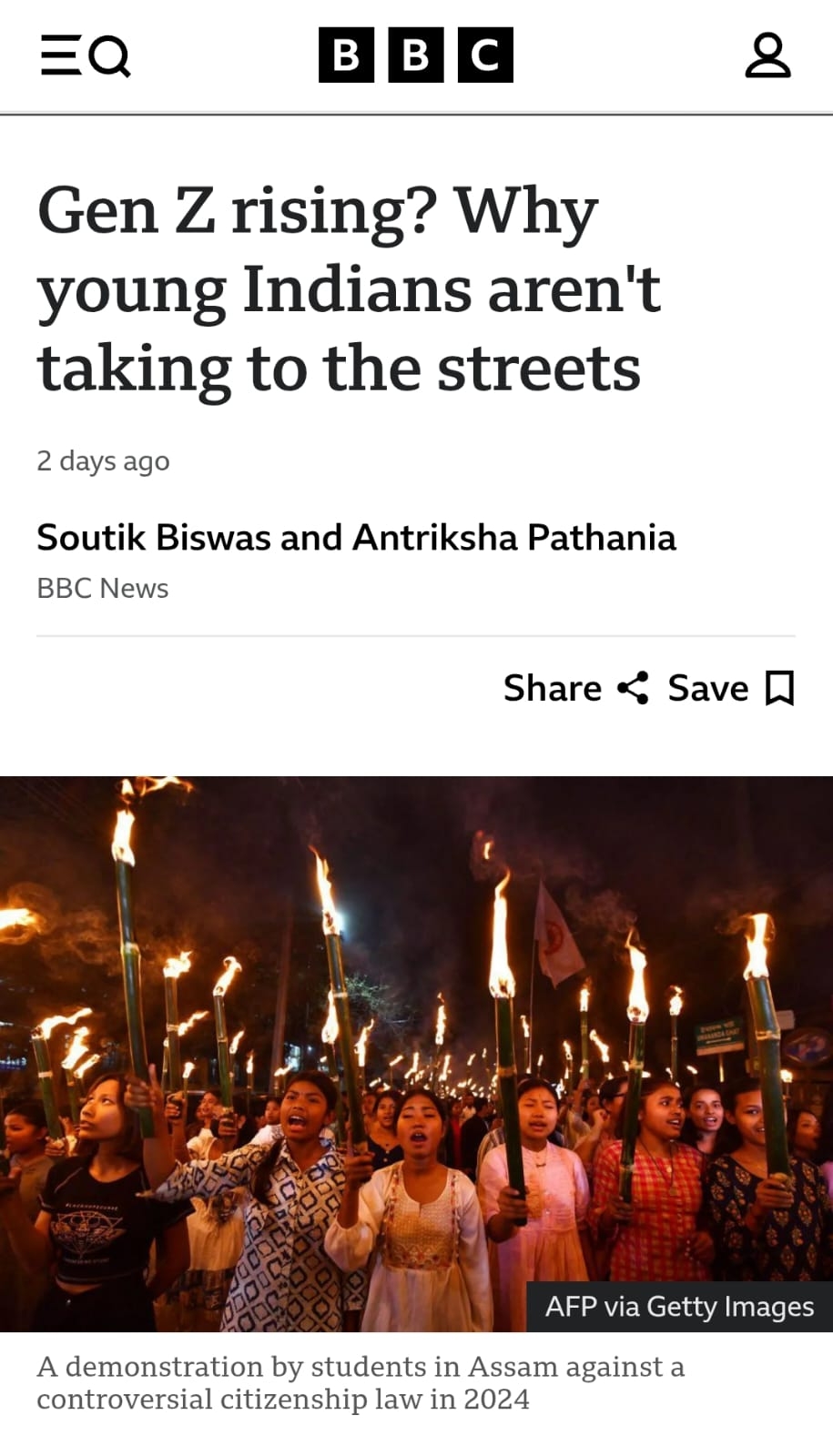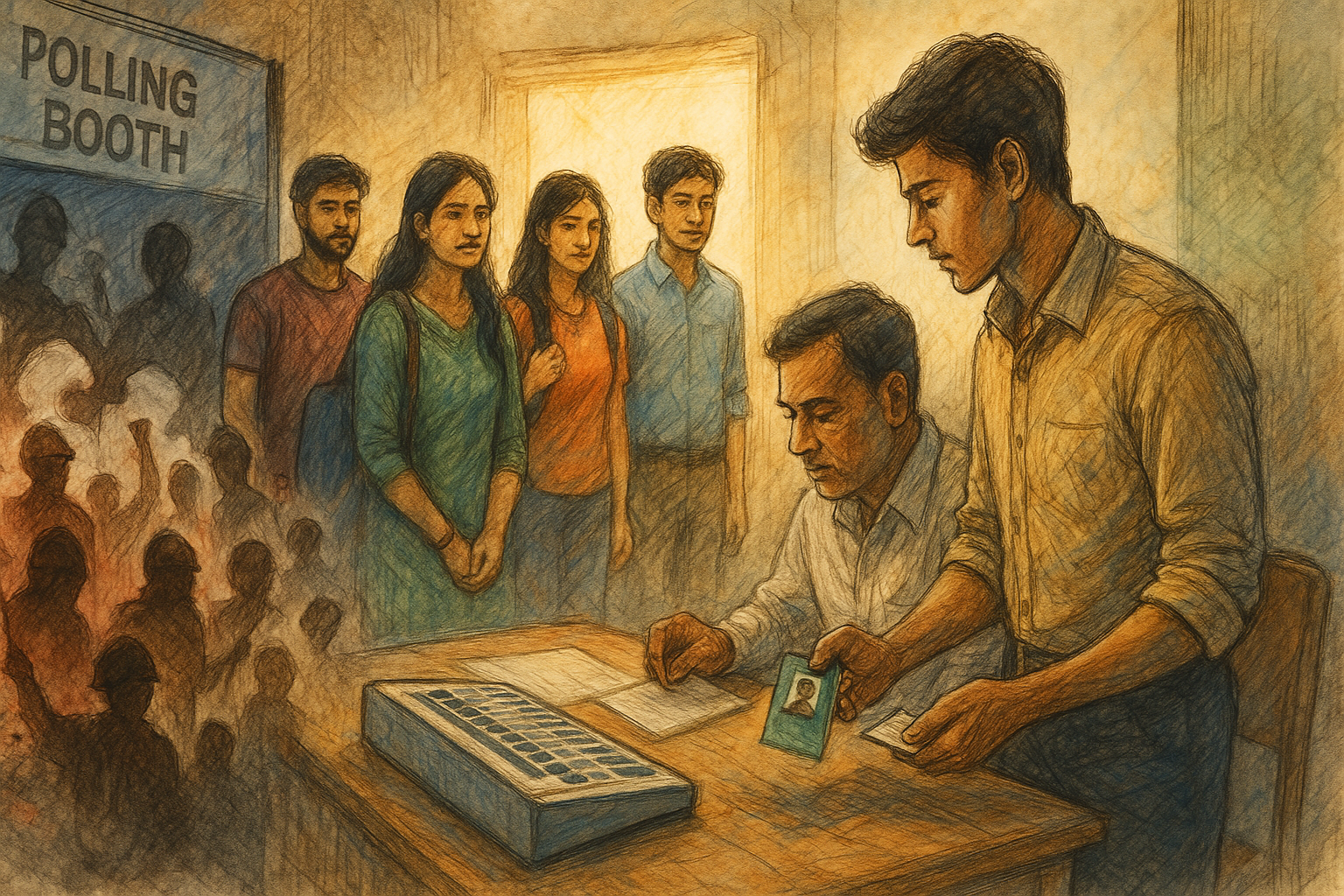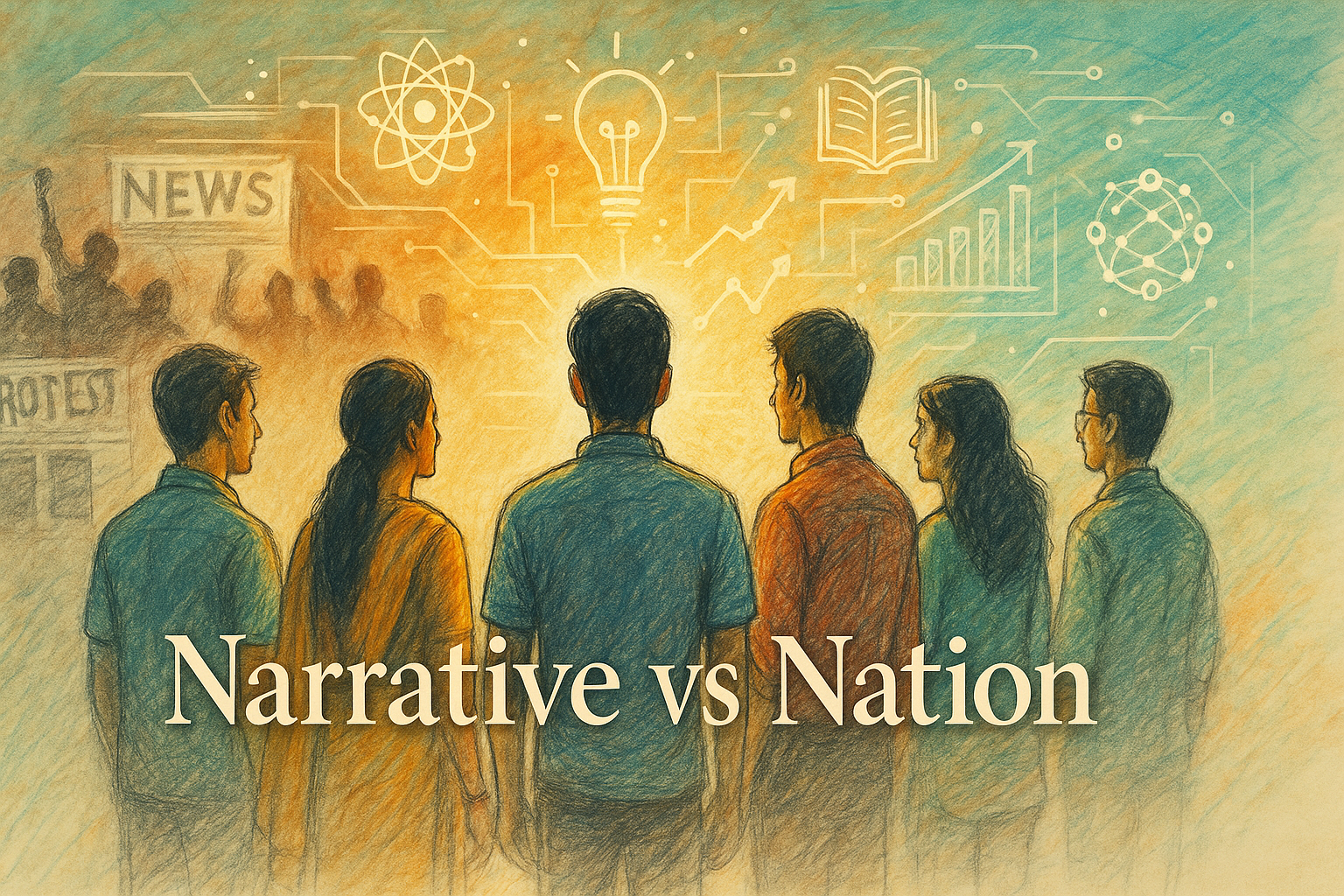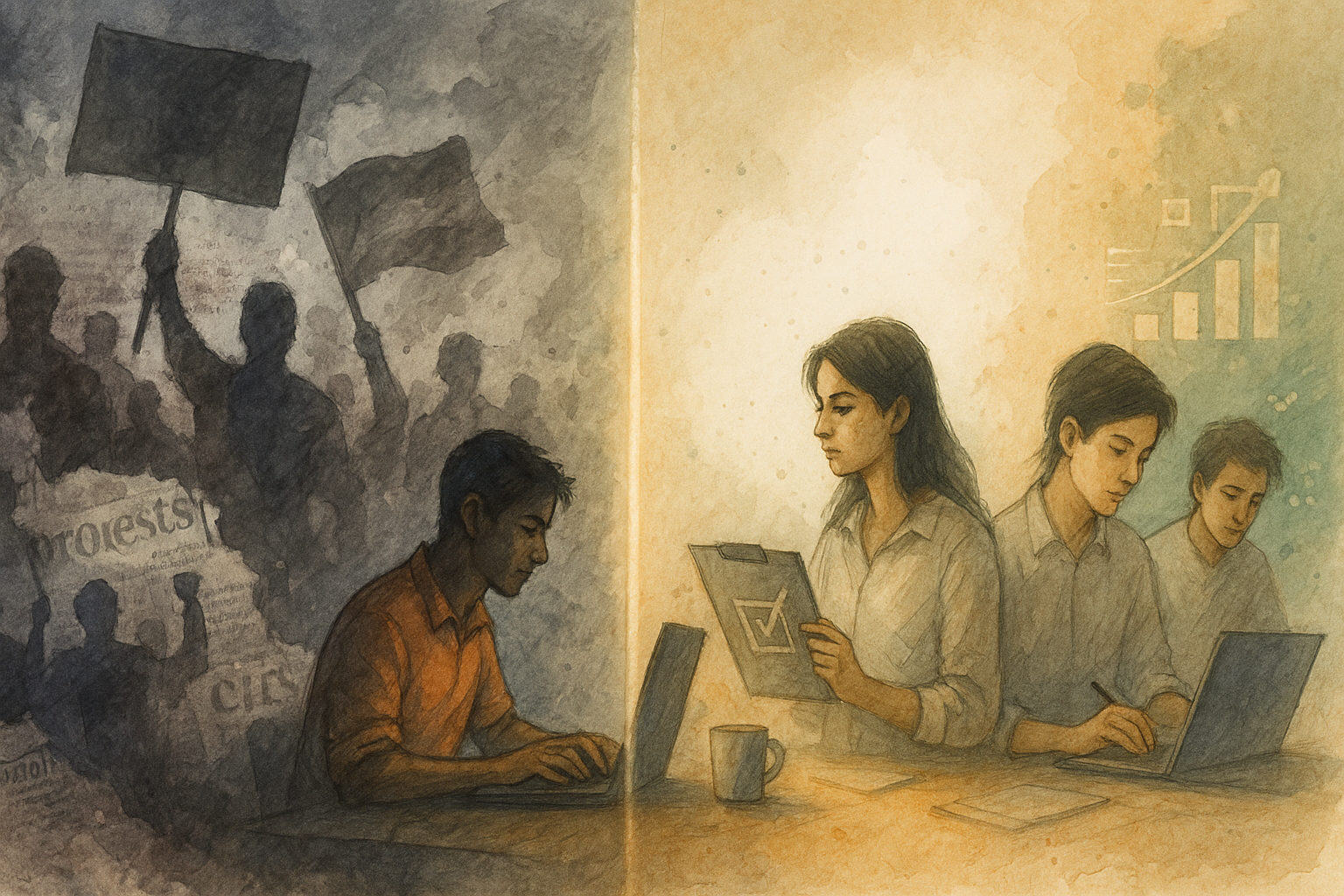Debunking the BBC’s Doom: India’s Gen Z is Building, Not Burning
The BBC’s narrative of a rebellious, fragmented Indian Gen Z is a distortion of reality. Far from fueling unrest, India’s 370 million youth are driving innovation, powering startups, and strengthening a vibrant democracy.
_202510251402152955_H@@IGHT_1024_W@@IDTH_1536.jpg)
In a recent piece, the BBC has once again donned its familiar cloak of sensationalism, painting a distorted portrait of India’s vibrant and diverse Gen Z as a restless, rebellious cohort teetering on the edge of revolt.
Titled with the kind of dramatic flourish that has become the broadcaster’s hallmark, the article suggests that India’s 370 million young people are primed for upheaval, drawing parallels with youth-led uprisings in Nepal, Bangladesh, and Madagascar.
This is not just lazy journalism, it’s a deliberate attempt to craft a narrative of discontent that undermines India’s thriving democracy and economic progress.
The BBC, alongside its columnists, stands guilty of peddling half-truths, cherry-picking anecdotes, and ignoring the broader context of a nation that is not only stable but flourishing.

This counter-article dismantles their misleading claims, exposing the broadcaster’s agenda to ignite unrest where none exists and highlighting the resilience of India’s Gen Z within a robust democratic framework.
Let’s begin with the BBC’s central premise: that India’s Gen Z is a powder keg of frustration, stifled by fears of being branded “anti-national” and fragmented by caste, regional, and linguistic divides. The article leans heavily on isolated incidents like protests in Ladakh over statehood or Rahul Gandhi’s unverified claims of electoral fraud in Karnataka, to suggest a simmering national unrest.
This is a gross misrepresentation. India’s youth, far from being a monolithic group itching for revolution, are actively engaged in shaping the nation’s future through democratic participation, entrepreneurship, and innovation.
The BBC conveniently ignores that India’s democracy, one of the world’s largest, has consistently delivered free and fair elections, with the 2024 general election seeing a turnout of over 66%, as reported by the Election Commission of India.

Far from being apathetic, as the BBC insinuates with its claim of only 38% of 18-year-olds registering to vote, India’s young voters are increasingly vocal, with platforms like X buzzing with debates on policy, governance, and development. The article’s attempt to equate India’s complex, pluralistic society with the more centralized unrest in Nepal or Bangladesh is not just misleading, it’s intellectually dishonest.
The BBC’s narrative hinges on a selective reading of India’s socio-political landscape, amplifying voices like that of Sudhanshu Kaushik, a youth activist quoted as saying India’s Gen Z is too fragmented for a unified uprising. While diversity in caste, language, and region is a reality, the BBC twists this into a weakness, ignoring how India’s federal structure celebrates these differences as a strength.
The article fails to acknowledge that this diversity has fostered resilience, not division. For instance, the same Gen Z that the BBC paints as fractured has driven India’s startup ecosystem to global prominence, with over 100 unicorns valued at $350 billion, as per a 2025 Hurun India report.

Young Indians are launching businesses, creating jobs, and leading in tech, from AI to fintech, at a time when the country’s GDP growth rate of 6.8% (per IMF estimates for 2025) outpaces most global economies. To suggest that this generation is merely stewing in discontent is to ignore their tangible contributions to a nation on the rise.
India, by contrast, is a union behemoth with a Constitution that has weathered challenges for 75 years. The article’s reference to Ladakh’s protests as evidence of “Gen Z’s frenzy” is particularly galling. These were localized demands for statehood, rooted in specific regional aspirations, not a national call to arms.
By inflating such incidents, the BBC and its columnists betray a lack of understanding of India’s decentralized governance, where states and union territories routinely negotiate their rights within a robust federal framework. To equate this with revolutionary fervor is not just sloppy, it’s a calculated effort to sensationalize.
The BBC’s reliance on anecdotal voices, like that of 26-year-old journalist Vipul Kumar or 23-year-old researcher Hajara Najeeb, further exposes its agenda. These individuals, while entitled to their views, are presented as representative of 370 million people, a gross overreach.
Kumar’s claim that “power in India is much more decentralized” is spun by the BBC to suggest paralysis, when in reality, it underscores the strength of India’s federal system, where states like Tamil Nadu, Gujarat, and Maharashtra tailor policies to local needs.

The article’s mention of protests over jallikattu in Tamil Nadu or affirmative action in Gujarat ignores the democratic resolution of these issues, jallikattu was reinstated after legislative amendments, and affirmative action debates are part of ongoing policy discourse. This is not fragmentation; it’s democracy in action, a process the BBC seems intent on misrepresenting as chaos.
Perhaps the most insidious element of the article is its insinuation that India’s government stifles dissent by branding critics “anti-national.” This is a tired trope, one the BBC has recycled for years to paint India as an authoritarian state. The reality is far more nuanced.
India’s judiciary, one of the most independent in the world, routinely checks government overreach, as seen in recent rulings on electoral bonds and privacy rights.
The article’s reference to the 2019 Citizenship Amendment Act (CAA) protests and the arrest of Umar Khalid is particularly manipulative. It omits that the CAA protests, while significant, were marred by violence in some instances, with Delhi’s 2020 Anti-Hindu riots claiming 53 lives, as per official reports.
The government’s response, while criticized, was aimed at restoring order, not silencing dissent. To portray this as a blanket crackdown on Gen Z activism is to ignore the complexities of maintaining law and order in a nation of 1.4 billion.
The National Education Policy 2020, lauded globally, is reshaping higher education to foster critical thinking and innovation. These are hardly the actions of a government suppressing its youth.
Yet the BBC chooses to highlight “muted engagement” and low voter trust, citing a survey by an obscure “citizen media platform” while ignoring more comprehensive data, like the post-election survey showing 65% of young voters expressing confidence in India’s democratic institutions in 2024. This cherry-picking is not journalism, it’s propaganda dressed up as reporting.
The article’s invocation of historical protests, like the anti-Indira Gandhi movements of the 1970s or the Anna Hazare anti-corruption campaign, is another attempt to force a narrative of perpetual unrest. These movements, while significant, were products of their time, not evidence of a Gen Z primed for rebellion.
The BBC’s suggestion that India’s youth are “watchful rather than rebellious” is a grudging admission of the truth: India’s Gen Z is pragmatic, not revolutionary. They are navigating a complex world with unprecedented opportunities, studying abroad in record numbers (1.3 million Indian students globally in 2024, per UNESCO), dominating fields like AI and green tech, and engaging in civic life through digital platforms.

The X posts and Reddit threads the BBC cites as evidence of “raging debate” are just that debates, not calls to arms. To frame them otherwise is to misread the pulse of a generation that values progress over protest.
The BBC’s broader agenda cannot be ignored. For decades, it has faced accusations of bias against India, from its coverage of Kashmir to its portrayal of the BJP’s Hindu nationalism. This article fits that pattern, subtly stoking fears of unrest while ignoring India’s economic and democratic successes.
This hypocrisy, warning against romanticizing leaderless revolts while romanticizing the idea of a Gen Z uprising, is peak BBC. India’s Gen Z deserves better than to be pawns in the BBC’s narrative games. They are not a homogenous mass of discontent but a dynamic force driving India’s ascent as a global power. The nation’s democracy, far from being under threat, is a model of resilience, balancing diversity with unity.
Its economy, growing faster than most, offers opportunities that the BBC’s gloom-and-doom lens refuses to see. By peddling a story of division and unrest, the BBC and its columnists do a disservice to India’s youth and the nation they are helping build.
This is not just bad journalism, it’s a betrayal of the truth, and India’s Gen Z, with their ambition and pragmatism, will prove it wrong by continuing to thrive in a democracy that is anything but fragile.


